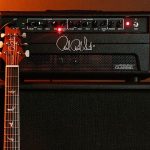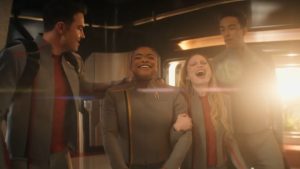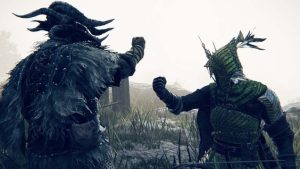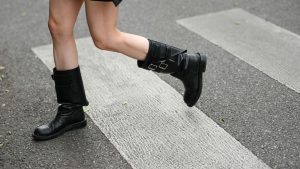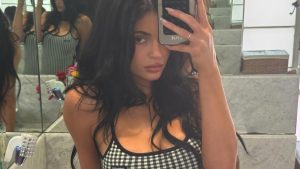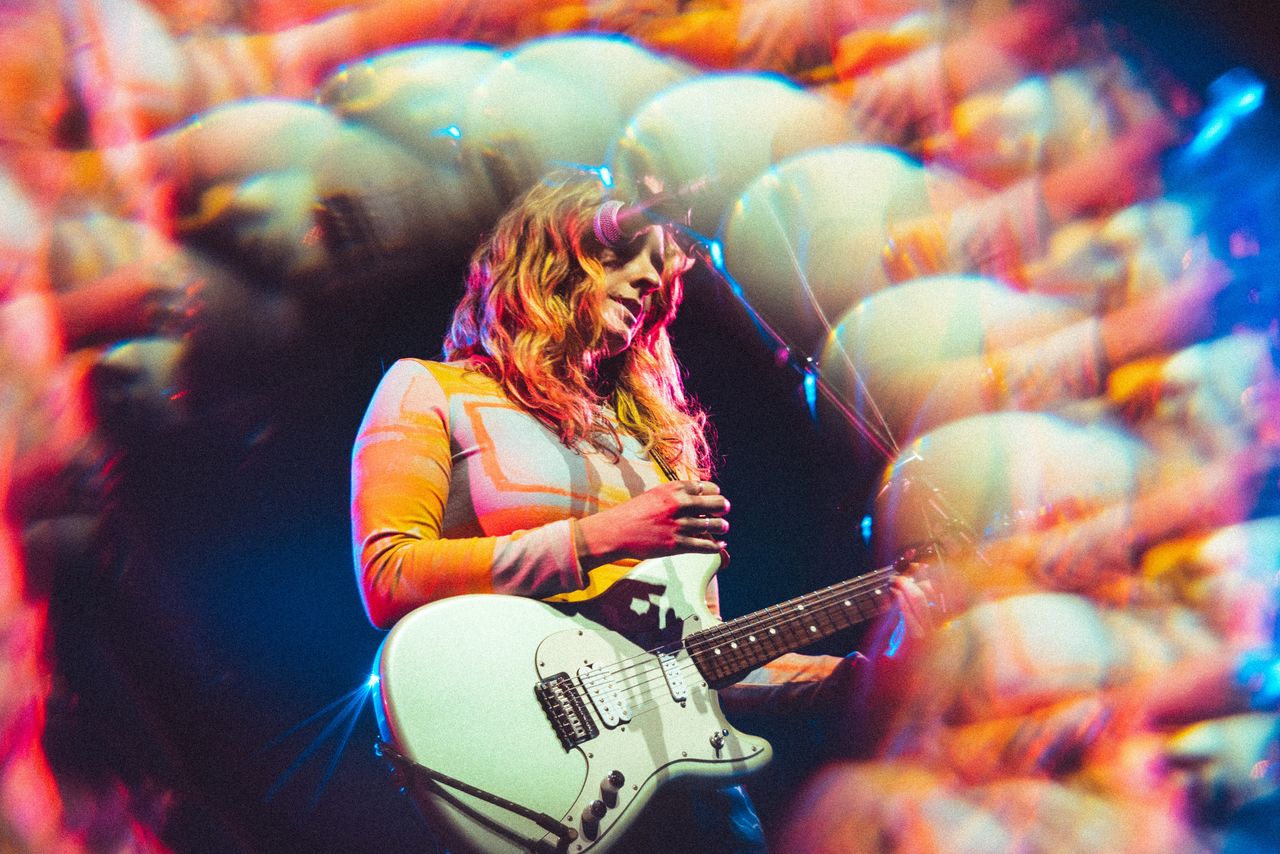
“It was already broken, but now we’re seeing how broken and how evil it really is”: Merpire on the rise of AI bands, and the recording of her new dream pop opus Milk Pool
(Image credit: rcstills)
Merpire is the performing name of Melbourne-based solo artist Rhiannon Atkinson-Howatt. Her 2021 debut Simulation Ride – released slap bang at the height of the Covid period – sounded like a modern, bedroom-recorded take on the high production sensibilities of ‘90s alternative pop. Now, four years later, that debut is followed by Milk Pool, which transmutes alternative pop into something dreamier and blurrier, without sacrificing hooks and momentum.
It’s a more confident and varied record compared to its predecessor, and within its dayglo pop swirls is a fascinating, painterly approach to the guitar. While the instrument doesn’t take a front seat – this feels like a record written with a whole studio – Atkinson-Howatt’s guitar serves a huge number of textural responsibilities.
Australian Guitar spent some time with Merpire to discuss her approach to composition and recording, the enduring moodiness of a palm-muted verse, and the new reality for IRL artists in the age of AI.
Four years after Simulation Ride released, how do you feel about it now?Being a first album, it’ll always be special. I’m so proud of what James (Seymour) my producer and I created together. Still, playing the singles from it live with the band, I forget about a few of the other songs on the record until someone reminds me. Like ‘Sink In’: that’s one of my favourite songs I’ve ever written. I love the interlude to that song too. I sometimes get it stuck in my head. There’s so much to love from what came as a result of putting that record out – connection with fans and hearing what different songs mean to people.
Milk Pool is a nice evolution from that record – especially on the level of production. There’s a striking intricacy and attention to detail. How did you know when it was done?
It was definitely difficult to decide when it was done, particularly in the mixing phase, which Ali the mixing engineer very patiently worked with me back and forth on. It was a real psychological challenge at times because of that intricacy. I’d scour each song and pick out where maybe a note on a synth was too long, or a guitar needed to be brought forward. It was a real zoom in, then zoom out, then zoom in, then zoom out operation.
I’d say there were about three or four songs that sounded done to me after Ali’s first pass at mixing them. My producer on most of the songs, James (Seymour), mixed as we co-produced, so he got some of them a good chunk of the way there before Ali worked his magic. James is one of the best producers I’ve ever had the pleasure of working with. We produced Simulation Ride together too so we had that trust and connection to work from. I loved having more of an input on production and mixing with Milk Pool. The sonic world of Merpire has expanded and become more character-full.
(Image credit: rcstills)‘Premonition’ has a dreamy quality: the palm-muted chugging sits perfectly with the glistening melodic elements. Where do you start when writing a song like that? It doesn’t seem as straightforward as sitting on a couch with a guitar.
This one was the hardest to get right, production wise. Writing, not so much to be honest. I wrote it on a nylon in open ‘D’ with a high ‘E’, and a capo on the first fret. It was one of the first songs where I’d written a guitar riff to play while singing. This happens over the chorus. I’m not the greatest guitarist so to write the riff over the chorus, I strummed the open chord most of the time and just hit individual notes for the riff to ring in between.
All the latest guitar news, interviews, lessons, reviews, deals and more, direct to your inbox!
We decided the dreamy synth would play the walk-down notes while I sang the syncopated words ‘I get a prem-o-nit-ion’ as one note. Then we brought the guitar back in for the three-note chromatic climb back up between the words ‘hug it out’ and ‘I get a premonition’. I love how tiny it sounds in contrast to the synth. It sounds like a little kitten. I love it.
When transposing some of the parts to synth, and simplifying the chugging guitar chords, I was disappointed at first that some of those 5th, 7th and dissonant notes on the guitar in that tuning were lost, particularly in the middle 8. I also wrote the verses in 7/8. But again, as we changed the whole song to 4/4, it was a reminder to listen to what the song calls for and it wanted to be a pop banger! I keep those alternate chords and notes for when performing it solo.
Merpire – ‘Premonition’ (Official Video) – YouTube
Watch On
You seem to love a good palm-muted verse. I detect a dreamy ‘80s and ‘90s radio quality in the record at times. What would you name as chief inspirations?
I do love a good palm-muted chug! You know, I was actually reminded today of a few bands that surely play a deep-rooted part in the way I write on guitar, particularly for dynamics. I’m talking Creed, Nickelback, Pearl Jam, Nirvana. And more recently, Mitski, Japanese Breakfast, Jay Som.
‘Retriever’ is a great example of your versatility as a guitarist: there’s the propulsive palm-muting, some gently melancholic clean jangle, and a squalling, stumbling lead. These elements sound mis-matched on paper but they work brilliantly in practice. What’s your journey as a player?
It’s so funny, I still don’t necessarily think of myself as a versatile guitarist. It’s only been in the last three years or so that I consider myself even a proficient guitarist. I picked up the guitar in high school and played it on and off while writing. I played enough to be able to get by when playing small gigs and open mic nights around town.
What really helped my confidence, and also helped develop my skills on guitar – like when I mentioned writing that guitar riff over ‘Premonition’ – was joining another band as one of the lead guitarists. This was my mates, RAT!hammock. If you haven’t delved, I strongly urge you to. Jackson, the lead songwriter, is truly one of the best you’ll ever hear.
That feeling when you go from thinking a part is impossible to play and you get really frustrated, to your fingers magically and suddenly being able to do it: it’s one of the best feelings ever.
I remember so clearly, Jackson showing me the parts he wanted me to play and I laughed and said ‘There’s no way I can do that! Especially if you want me to sing harmonies as well.’ He said, ‘I reckon you could do it. Just have a go, and if you don’t feel comfortable, you can play something else.’ Like most things in life for me, I’ll do things that are hard if they’re for other people. So I went home and practised and – what do you know? – I could do it. That feeling when you go from thinking a part is impossible to play and you get really frustrated, to your fingers magically and suddenly being able to do it: it’s one of the best feelings ever.
The attention to texture extends even to the more conventional acoustic-centric songs like ‘Cinnamon’ and ‘You Are Loved’. The guitar on the latter sounds deliberately “poorly” mic’ced. What’s the thinking behind that?
It certainly does. ‘You Are Loved’ is entirely one phone recording. It’s the sound of me writing the song as it’s coming to me. I had thought about re-recording it but the way it sounded so rough and sad was exactly how it needed to be to me. I couldn’t tap into feeling that way again, and the room I wrote it in – even though you probably can’t hear it – had the best acoustics to sing and play in. I wrote many songs in that room.
I was cat-sitting for a friend and I love that you can hear their cat taking a shit in the kitty litter in the background. That’s the stuff you can’t write! It was like someone had control of the situation and was saying “Oh, you’re feeling dark and broody and sorry for yourself? Well here’s a cat in the kitty litter to remind you that life just be that way sometimes and everything exists together.”
(Image credit: rcstills)I love the heavily chorus-laden guitar melodies in ‘Rosanna’ – it’s reminiscent of ‘90s grunge ballads or, more recently, ML Buch. Your playing sounds especially concerned with atmosphere – are you a pedal hoarder?
That was all Elizabeth M. Drummond, who produced this song. You should definitely check out her self-produced solo stuff too. She’s got an envious collection of chorus pedals, none of which I can name. But yes, atmosphere is definitely important across everything for me. Liz is truly a wizard at building certain atmospheric moods within songs. I love what she did with the instrumental too. So creepy and stalky.
I wish I could be a pedal hoarder. Alas, I cannot afford it. I’ve been lucky enough to get guitar pedals as birthday presents. My favourites at the moment are a DOD overdrive and this (TC Electronic) Tailspin vibrato. I use them together when playing the song, ‘Canine’ live on a nylon.
What guitars and amps do you predominantly use on the record?
I’m in love with the chorus setting on the Roland JC-120, especially on a Tele playing bass lines. That amp really helped inspire that choice when writing in open tunings. I could play around all day.
At home I have a Fender Superchamp. It’s a tube amp with settings to replicate other vintage Fender amps. That’s really fun to muck around on.
To be honest, apart from that, I didn’t really take too much notice of the amps we used! Often, James would set them up in another room so we could blast them and not blow our heads off.
With some streaming platforms becoming increasingly flooded with “fake bands”, how do you feel about AI and its increasing incursion in creative spaces? Do you feel threatened by it?
Ah, it makes me pretty mad. The whole thing. The platforms, the industry. It was already broken, but now we’re seeing how broken and how evil it really is. So much of it has nothing to do with music either. Just money and power.
Only today I heard about this band that’s potentially AI-generated, Velvet Sundown. If they’re not, they’re unintentionally or intentionally doing everything they can to appear that way. It could be a clever publicity stunt or an accident but – and again, sorry if they’re real – I really hope they’re fake so we can tear down another part of this facade that DSPs aren’t just evil overlords in cahoots with major labels.
I’d like to think I could hear if something isn’t “real” but I’m yet to test this theory. I do however think there is something in music, live or recorded, that cannot be heard, only felt. Like how the singer was feeling that day, or the room it was recorded in. I think energy gets picked up that you can’t see or name. A great example of this is hearing for the first time, the first second of the song, ‘Tonight’ by Sibylle Baier. Even before reading the fascinating story about her, you can hear there’s something magic about it.
How has the Melbourne scene picked up post-Covid? Is it feeling healthy again? Is it still hard as a working musician?
Oh man. It’s still so hard. It’s almost laughable because it’s just so ridiculous. It’s healthy in terms of people making and sharing incredible music any way they can, but when you’re trying to find your way around a broken, elitist industry, matched with the cost of living, ‘cultural cringe’, underrepresentation and a lack of respect from government, your community is all you have. That’s what my song, ‘Fishing’ is about, actually.
Melbourne’s music scene is proof though that you just can’t kill art. All the time I’m seeing new and creative initiatives pop up from artists themselves, industry workers and venues, just doing what we can with what we’ve got. It’s very inspiring and empowering.
What can people expect from Merpire in a live capacity, post Milk Pool? It sounds like a very band-centric record.
You’re right, it is a very band-centric record. I love performing with my band. We’ve been together for eight years, plus some absolute legends that fill in when
need be.
When I have the chance to put on a band show, we’re all in. It’s dynamic. It’s powerful. It’s anthemic. It’s intimate and vulnerable. We respect and love our audiences because without them there, it’s not the show. The magic only happens when there’s people there playing their part to create what sometimes can be a pretty surreal ebb and flow, pushing and pulling of energy.
I chat to the audience like I’m just in my lounge room at home and – so I’m told – my banter is one of the most entertaining things about the set (laughs). Being on stage with my band is my favourite place in the world and I live to share that with anyone who wants to witness it.
To be asked this question initially makes me sad. I’m an independent artist. I’m essentially a solo artist that hires my band as session musicians. From my business savings and money earned from work I do outside of music to have those business savings, I pay my band a fair fee for rehearsals and shows. Because I want to do right by them, I have to be careful about the gigs I choose to play. It’s really expensive. I’d give my everything to be able to do a national band tour but when each show is costing me a minimum AU$2,000 just in band fees, it makes it very difficult.
I forget sometimes that general punters don’t know that as solo independent artists, we’re paying for the whole band’s fees, flights, accommodation, travel days. Without grants and a bit of help from my angel of a Mum from time to time, I’d have no chance.
What I can do though is get creative with solo shows. I love playing solo too. I can be more dynamic with my guitar-playing, pedals and the songs in general. I’ve got a solo tour coming up in August. Between sets, myself and the artist who’ll be opening the show are going to have a Q and A type chat between us to share our highs and lows of pursuing this career, how people can support us and anything else we want to share. It’s important to have these conversations outside of your community to help make change.
Merpire’s Milk Pool is out now.
This article will appear in Australian Guitar #164, which hits newsstands on August 4, 2025. Subscribe and save via TechMags or iSubscribe.”When all the computers fall apart, when the world burns to the ground, there’s going to be a guitar left”: Courtney Barnett talks the godfather of grunge, fingerstyle, AI and music, and her next move
Shaun Prescott is the editor of Australian Guitar Magazine. He has written across a variety of publications, including The Guardian, the Sydney Morning Herald, and Guitarist Magazine.




